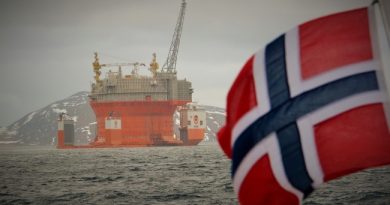Arctic allies meet in Iceland to tackle growing security challenges, climate

Military leaders from Iceland, the U.S., Canada, Denmark, Finland, Norway, and Sweden met in Keflavík, Iceland, this week to discuss Arctic security.
This year’s meeting focused on growing concerns around Russia’s increasing military presence in the North and cooperation with China in the region.
“The goal is to enhance our domain awareness and maneuver building in the Arctic,” Chairman of the Joint Chiefs of Staff Air Force Gen. CQ Brown, Jr. said in a statement.
“The U.S. commitment is to secure the Arctic, uphold international law and support our NATO allies.”
The annual Chiefs of Defence meeting also addressed climate change’s ongoing effects on melting ice, which is opening up new sea routes and potential access to valuable resources.

The representatives of the seven out of eight Arctic countries said improved cooperation between their nations was needed to respond to these challenges as well as the increasing attention the North from the global community.
“We are seeing more and more activity where Russia and [China] are working together, and the Arctic is the most recent area we’re seeing,” Brown said.
“It’s something we all need to be paying attention to.”
Maintaining situational awareness amongst allies
Iceland, which hosted the meeting, highlighted the importance of close cooperation between the nations in a challenging environment, especially since Russia’s invasion of Ukraine.
“These key annual meetings between close Allies serve to coordinate and deepen partnerships and strengthen shared situational awareness,” Iceland’s Ministry of Foreign Affairs said.
This meeting was also the first for Brown as Chairman, and comes after the release of the U.S. Department of Defense’s 2024 Arctic Strategy.

The strategy focused on strengthening monitoring, working more closely with allies, and ensuring the U.S. and its partners are ready to face any potential threats in the Arctic.
Priorities included upgrading space-based missile detection systems, advancing over-the-horizon radar technology, and improving infrastructure to adapt to the fast-changing environment. The strategy also noted the growing cooperation between Russia and China in the Arctic, and said it raised concerns about regional stability and U.S. interests.
Beyond security, the Oct. 9 chiefs’ meeting also covered the rise in maritime traffic and economic activity in the Arctic, and the need for northern nations to tackle these challenges together.
Comments, tips or story ideas? Contact Eilís at eilis.quinn(at)cbc.ca
Related stories from around the North:
Canada : Canadian military says it has tracked, stopped China surveillance in Arctic waters, The Canadian Press
Finland: Russian cyber attacks, espionage pose growing threat to Finnish national security, Yle news
Iceland: Iceland authorizes U.S. submarine service visits, Eye on the Arctic
Norway: Norway defence budget to ensure armed forces strong enough to deter Russia, The Independent Barents Observer
Russia: Newest frigate trained anti-aircraft, anti-drone shootings, The Independent Barents Observer
Sweden: Exercise to strengthen Nordic cooperation on food preparedness, Radio Sweden
United States: Startling video shows Russian fighter jet flying within feet of U.S. F-16 near Alaska, The Associated Press



